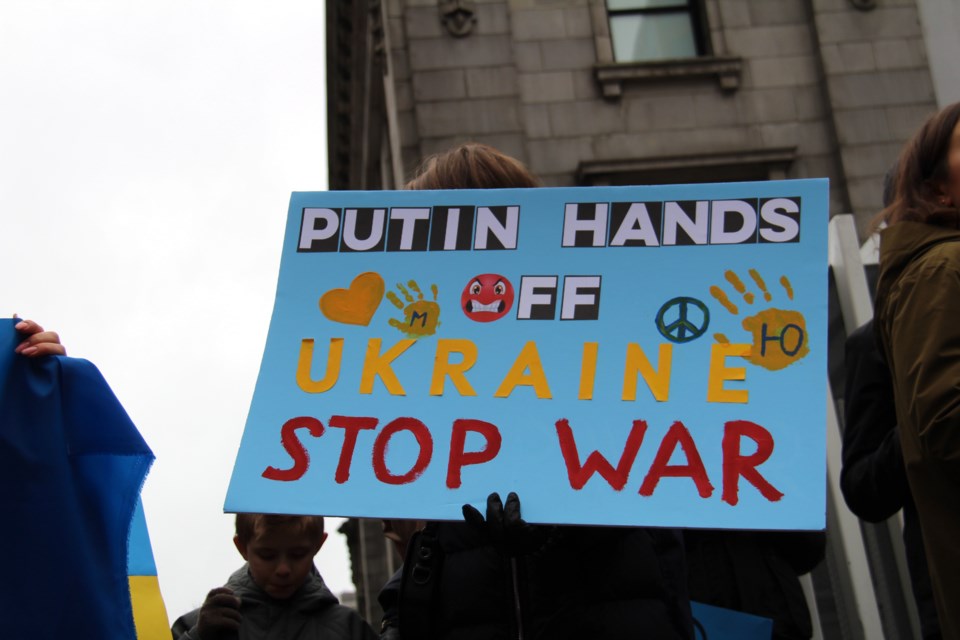NewmarketToday welcomes letters to the editor at [email protected]. Please include your daytime phone number and address (for verification of authorship, not publication).
Although the door for peace negotiation should always be opened as a matter of principle, the West should not be fouled by Russian cognitive warfare: Putin has crossed the Rubicon and will not stop until all of Ukraine is fully integrated into a “greater Russia.” For him, there is no turning back.
Vladimir Putin has been talking openly for years now that anyone in Russia who does not want the recreation of Soviet Union has no heart, but anyone who wants to reconstitute it as it was has no head. In other words, for him any true Russian patriot would want to reform a greater Russia, but it should be done through better ways than in the past.
In fact, for Putin there is no greater national project but to reconstitute a greater Russia, no matter the cost might be. An important piece of this project is getting back Ukraine into a pro-Russia and pro-Kremlin posture in one form or another.
Such thinking may seem surrealist for us in the West, but one has to understand that such views are quite widespread in Russia, even if many Russians disagree and have courageously stated it recently. Putin and those who follow him are afraid of the advance of democracy and liberalism in Eastern Europe.
There are long traditions of having strong and harsh rulers in Russia, and recent rulers who had a democratic bent like Gorbatchev and Yeltsin are seen as weak and too prone to acquiesce to Western demands. Hence, there is this widely shared bias in Russia that only autocrats can lead the country effectively. Then, what we call liberalism, for many Russians it is perceived as Western decadence, as immorality and a general lack of sound social and spiritual values.
The notion of “Western decadence” widely use during the Cold War has very little to do with the Marxist nature of the Soviet Union; it was and still is a matter of social and cultural interpretation of the world.
It is in this context that the westernization of Ukraine has been perceived by Putin and his friends as a threat to what he calls “true Russian values.” He said that much in his statement of Feb. 24, prior to the invasion of Ukraine. As well, he has been very clear that the reconstitution of a greater Russia is the only way to protect those “true Russian values” against the Western liberal Borg advancing eastward.
Further clues that Putin will not settle for anything but an entire Ukraine being fully pro-Russia can be found in the Feb. 24 speech. Aware that Russia will face significant sanctions; he made a number of allusions to the Great Patriotic War (Second World War in the Soviet Union) that has required massive sacrifice from the population. He is expecting the same, but on the economic front. His statement that the economic sanctions are a declaration of economic war makes perfect sense in his own views of the world.
The latest demands from Russia for agreeing to a ceasefire, namely removing from the Ukrainian constitution the goals of joining the EU and NATO, to accept the annexation of Crimea, and to recognize the independence of the Donbass separatist provinces are just that, only pre-requisites for a ceasefire. They are in no way demands for achieving a comprehensive peace settlement.
Only by Ukraine accepting to be part of a greater Russia, in one form or another, will lead to any full peace agreement acceptable to Russia.
Then, the Ukrainians surprised the Russian army by the effectiveness of their military resistance. The clearer prospect of a long insurgency war if the Ukrainian military cannot stop fully the Russian army has also been understood by Putin. The tone from the Kremlin changed accordingly, talking about loss of statehood by Ukraine if they persist in fighting.
What Putin meant was that he is fine with a full annexation of all Ukraine, and to keep the Russian army there as long as needed to crush any insurgency. No more need for a loose confederation of pro-Russian states when it comes to Ukraine.
If the West wants to save Ukrainian people from further deaths, devastation and misery, only imposing quickly massive sanctions might do it, while continuing to provide military, financial and humanitarian aid for Ukraine to resist the Russian invasion. And again, this is not about bringing Putin to the negotiation table, as it is now futile, but for creating the conditions where Putin will face a putsch and be replaced by more pragmatic people in Russia.
Putin has thrown everything he has in this invasion; for him it is all or nothing. There is no genuine negotiation possible with him on any peace settlement. Ukrainian people have understood that long ago, now the West needs to wake up to reality, as scary as it might be.
Eric Ouellet, Professor, Department of Defence Studies, Royal Military College of Canada
Newmarket


